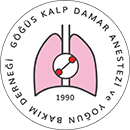

Evaluation of Different Risk Scores in Coronary Artery Bypass Grafting Surgery
Ecem Kolcu Kuğu1, Şefika Türkan Kudsioğlu2, Osman Ekinci1, İbrahim Musab Köşker11Department of Anesthesiology and Reanimation, University of Health Sciences, Haydarpaşa Numune Training and Research Hospital, Istanbul, Türkiye2Department of Anesthesiology and Reanimation, University of Health Sciences, Dr. Siyami Ersek Chest Heart and Vascular Surgery Training and Research Hospital, Istanbul, Türkiye
Objectives: This study aimed to compare the European System for Cardiac Operative Risk Evaluation (EuroSCORE) II and the Age-Creatinine Ejection Fraction (ACEF) II scoring systems in adult patients undergoing elective coronary artery bypass grafting (CABG) surgery and to determine the contribution of obesity to mortality and morbidity.
Methods: A total of 175 patients over 18 years of age scheduled for elective isolated CABG surgery were randomly included in this prospective observational study. Demographic data, comorbidities, weight and height measurements, results of transthoracic echocardiography, and pulmonary function tests were recorded in the anesthesia outpatient or inpatient clinic. EuroSCORE II and ACEF II risk scores were obtained. The postoperative 30-day mortality of the study participants was recorded.
Results: The mean age was 60±12 years, and 24% (n=42) of the patients were female. The postoperative 30-day mortality rate was 3.4% (n=6). Chronic obstructive pulmonary disease, low creatinine clearance, and high creatinine levels were significantly associated with postoperative 30-day mortality (all p-values < 0.050). According to ROC analysis, EuroSCORE II (area under the curve [AUC]=0.675) and ACEF II (AUC=0.551) were not sensitive predictors, whereas body mass index (BMI) demonstrated better predictive ability (AUC=0.709) for postoperative 30-day mortality. The postoperative 30-day mortality correlated positively with EuroSCORE II and ACEF II but negatively with BMI. The postoperative 30-day mortality in patients with high EuroSCORE II and high ACEF II was 5% (n=6) and 4.3% (n=6), respectively.
Conclusion: BMI was a potentially good predictive factor for postoperative 30-day mortality. The postoperative 30-day mortality correlated positively with EuroSCORE II and ACEF II and negatively with BMI.
Makale Dili: İngilizce
(26 kere indirildi)

















